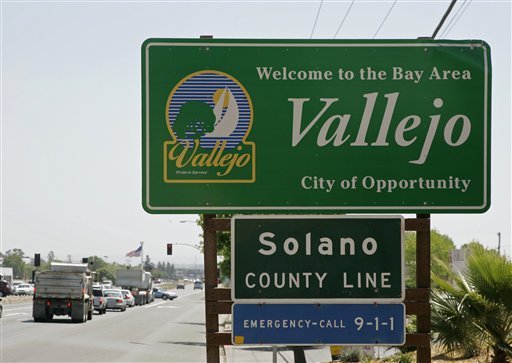Vallejo makes 'dying cities' and 'most miserable cities' lists, but may emerge from bankruptcy soon

They say no publicity is bad publicity, but doubtless Vallejo doesn't feel that way after being ranked by two national magazines as a deeply undesirable place to live.
Newsweek ranked Vallejo the #2 dying city due to its overall population decline between 2000 and 2009 and its decline in residents under 18. They also noted that Vallejo has one of the highest foreclosure rates in the nation. Forbes used 10 factors, including crime, unemployment, taxes, and commute times and ranked Vallejo the #9 most miserable city. Needless to say, boosters and supporters of Vallejo were not overjoyed at this news, but by any objective measure, the city remains in deep financial trouble.
Vallejo filed for bankruptcy in 2008 primarily as a result of the cratering real estate market and soaring public pension costs. Their revenues dropped precipitously and they simply could not meet obligations. What happened next ended up having major implications for municipalities facing financial ruin, as well as their creditors and most especially public unions. In the ensuing court battles, a U.S. district court ruled that Vallejo, and by implication other cities in bankruptcy, have the right to reject collective-bargaining agreements made with unions. This of course is an earthquake. It means the city can slash salaries, pensions, and benefits even if they have a pre-existing agreement with a union.
Vallejo has proposed a restructuring plan that needs to be approved by stakeholders and the courts. Chief among the obstacles is whether Vallejo can cut retiree benefits and pensions. This would directly affect CalPERS, the largest public pension in the country, who would almost certainly sue. But the public unions are just one of the two 800 pound gorillas here. The other one is the bondholders.
The more protected and senior of the bondholders may escape with a minor haircut, but unsecured bondholders may only get 5-20 cents on the dollar. If you thought the public unions threw a hissy fit at the thought of wages and pensions being cut, well, bondholders (hedge funds, investment banks, and mutual funds, mostly) can pitch a mighty tantrum too. They tend to do it behind closed doors, away from the media, but are at least as powerful as the unions.
So, a municipal bankruptcy like Vallejo's isn't just about union busting, as some liberals have charged, because the bondholders (generally considered to be conservative in nature) are getting slammed too. While some may want to use this as a pretext to break the unions (or the power of bondholders), the reality is Vallejo simply has run out of money. They've slashed services to the bone in a desperate attempt to stay solvent including cutting police and fire personnel by about 40%
The New York Times opines:
"when voters complain about bloated government payrolls, I'd wager that taking an ax to the police and fire departments is not the solution they have in mind."
The problem is, no one really knows what the solution is.




